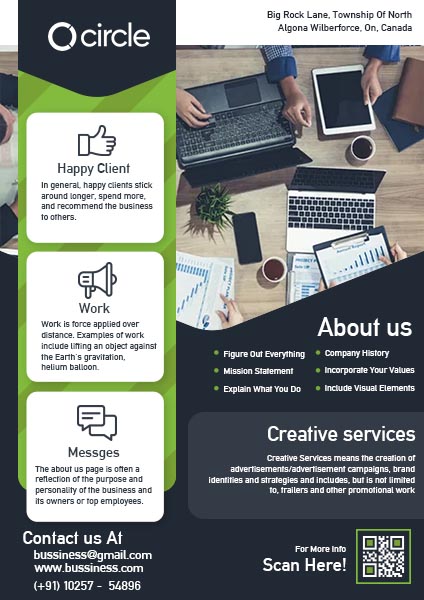Introduction
QR codes have become an essential tool for modern businesses, offering a seamless way to connect the physical and digital worlds. While static QR codes have been around for a while, dynamic QR codes are now revolutionizing the way small businesses operate. This guide will delve into the world of dynamic QR codes, highlighting their benefits, use cases, and best practices to help your business thrive.
What Are Dynamic QR Codes?
Dynamic QR codes are a type of QR code that allows you to change the content linked to the code without altering the code itself. Unlike static QR codes, which permanently link to a specific piece of information, dynamic QR codes offer flexibility and adaptability, making them a powerful tool for small businesses.
Benefits of Dynamic QR Codes for Small Businesses
Flexibility and Editability
One of the most significant advantages of dynamic QR codes is their flexibility. If you need to update the information linked to the QR code, you can do so without generating a new code. This feature is particularly useful for marketing campaigns, where content may need to be updated frequently.
Enhanced Tracking and Analytics
Dynamic QR codes come with built-in tracking capabilities, allowing you to gather data on how often the code is scanned, where it is scanned, and what devices are used. This data can provide valuable insights into customer behavior and the effectiveness of your marketing efforts.
Improved Customer Engagement
By using dynamic QR codes, you can create more interactive and engaging experiences for your customers. Whether it’s linking to a promotional video, a feedback form, or a personalized landing page, dynamic QR codes can help you connect with your audience in meaningful ways.
How Dynamic QR Codes Work
Dynamic QR codes use a short URL that redirects to the desired content. This URL can be changed at any time, allowing you to update the information without altering the QR code itself. For example, you could initially link to a special promotion and later change the link to a new product page, all while using the same QR code.
Use Cases for Dynamic QR Codes in Small Businesses
Marketing Campaigns
Dynamic QR codes can be used in various marketing materials, such as flyers, posters, and social media posts. They can link to special promotions, discount codes, or exclusive content, making your marketing efforts more dynamic and interactive.
Product Packaging
Including dynamic QR codes on product packaging can enhance the customer experience. For instance, you can link to instructional videos, product details, or customer reviews, providing valuable information at the point of purchase.
Event Management
Dynamic QR codes are also useful for managing events. You can use them for ticketing, check-ins, and providing event details. After the event, you can update the QR code to link to event highlights or feedback forms.
Creating Dynamic QR Codes: Step-by-Step Guide
Choosing a QR Code Generator
There are numerous QR code generators available, both free and paid. Some popular options include QR Code Generator, Crafty Art Qr Code Genrator, and Beaconstac. When choosing a generator, consider features like customization options, analytics, and ease of use.
Customizing Your QR Code
Most of QR code generators let you change the code’s appearance. You can change the color, add a logo, and choose different patterns. Ensure that the QR code remains easily scannable by maintaining a high contrast between the code and the background.
Implementing and Testing
Once you have created your dynamic QR code, test it on different devices to ensure it works correctly. Place the QR code on your marketing materials, product packaging, or event tickets, and monitor its performance using the analytics provided by the QR code generator.
Best Practices for Using Dynamic QR Codes
Design Tips for Visibility and Scannability
Ensure your QR code is visible and easy to scan by using high-contrast colors and a clear design. Avoid placing the QR code in areas where it might get distorted or obscured.
Ensuring Mobile-Friendliness
Since most people will scan your QR code with their mobile devices, make sure the linked content is mobile-friendly. Optimize landing pages, videos, and other linked content for a smooth mobile experience.
Regular Updates and Maintenance
Regularly update the content linked to your dynamic QR code to keep it relevant and engaging. Check the performance metrics to see what works and make necessary adjustments.
Tracking and Analyzing QR Code Performance
Key Metrics to Monitor
Monitor metrics such as the number of scans, the location of scans, and the devices used. These insights can help you understand customer behavior and the effectiveness of your QR code campaigns.
Tools for Tracking Performance
Use tools provided by your QR code generator or third-party analytics platforms like Google Analytics to track the performance of your dynamic QR codes. These tools can provide detailed reports and help you make data-driven decisions.
Interpreting Data for Business Insights
Analyze the data collected to gain insights into your customers’ preferences and behaviors. Use this information to refine your marketing strategies and improve customer engagement.
Common Mistakes using Dynamic QR Codes to Avoid
Overloading with Information
Keep the content linked to your QR code simple and focused. Overloading it with too much information can overwhelm users and reduce engagement.
Poor Design Choices
Avoid using low-contrast colors or overly complex designs that make the QR code difficult to scan. Test your design on different devices to ensure it works well.
Neglecting Updates and Testing
Regularly update the content linked to your QR code and test it to ensure it remains functional. Neglecting updates and testing can lead to broken links and a poor user experience.
Case Studies of Successful QR Code Implementations
Real-World Examples of Small Businesses
Many small businesses have successfully used dynamic QR codes to enhance their marketing efforts. For example, a local café used dynamic QR codes on their menus to link to daily specials, increasing customer engagement and sales.
Lessons Learned from Successful Campaigns
Successful QR code campaigns often involve clear goals, regular updates, and thorough testing. Learn from these examples to implement effective QR code strategies in your business.
Tools and Resources for Creating Dynamic QR Codes
Recommended QR Code Generators
Some recommended QR code generators include Crafty Art QR Code Generator, QR Stuff, and Beaconstac. These tools offer a range of features to help you create and manage dynamic QR codes effectively.
Additional Resources for Learning and Support
There are numerous online resources, including tutorials, blogs, and forums, that can help you learn more about dynamic QR codes and how to use them effectively. Websites like QR Code Tiger and Scanova offer valuable insights and support.
Future Trends in QR Code Technology
Innovations on the Horizon
As technology continues to evolve, we can expect new innovations in QR code technology, such as enhanced security features, integration with augmented reality, and more. Staying informed about these trends can help your business stay ahead of the curve.
How Small Businesses Can Stay Ahead
To stay ahead, small businesses should keep up with the latest trends and continuously explore new ways to use QR codes. Experimenting with different use cases and staying adaptable will ensure you make the most of this versatile technology.
Conclusion
Dynamic QR codes offer small businesses a flexible and powerful tool for enhancing customer engagement and marketing efforts. By understanding how to create, implement, and track dynamic QR codes, you can leverage this technology to drive growth and stay ahead in the competitive market.























